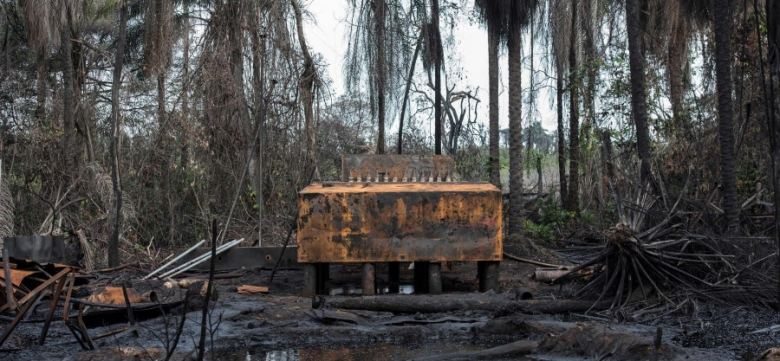
NIGERIAN OIL PRICE: $45-$46

BLOOMBERG - Africa's top oil producer is learning to ignore crude prices, Nigeria's Finance Minister Kemi Adeosun said.
"We've gotten to a point where we don't care," whether prices will be sustained at the level that they have recently risen to, Adeosun said during an interview in her office in the capital, Abuja. "We've been able to balance our budget at $45-$46 per barrel and we've got to learn to live comfortably at that level."
Brent crude has rallied almost 60 percent since the middle of last year as OPEC and allied producing nations stick to agreed output curbs. The global benchmark traded at about $70.25 per barrel in London on Friday morning.
The OPEC member is recovering from a contraction of its economy in 2016, the first in a quarter century, after a decline in oil prices and in the nation's output due to unrest in the key Niger river delta. The country can't afford to rely so much on the commodity anymore, Adeosun said.
Limit Exposure
"Yes, it's at $66-$67 per barrel today, but we've been here before, right?" she said Tuesday. "And we can't afford to be exposed to that, so I really try very hard to ignore the oil price."
President Muhammadu Buhari submitted in December a 2018 budget based on projected oil output, including condensates, of 2.3 million barrels a day at $45 per barrel.
Nigeria, which derives about two thirds of its revenue from crude, is seeking to diversify its economy. The government's efforts include pushing for agricultural expansion to reduce a heavy food-import bill and boost exports.
It is also seeking to plug an infrastructure gap of $25 billion, Adeosun said. "The infrastructure gap is significant, it is far bigger than anybody had imagined, in power, in roads, in rail."
Nigeria's foreign-exchange reserves have been boosted by the rise in crude prices, combined with an increase of oil shipments and improved investor confidence. Barring any shock, the Central Bank of Nigeria could build its reserves to $60 billion in the next 12 to 18 months, from $40 billion currently, Governor Godwin Emefiele said in an interview Wednesday.
-----
Earlier:

2018, January, 8, 19:10:00
NIGERIA'S FUEL DEFICITBLOOMBERG - A bigger problem is that Nigeria caps gasoline prices, often at levels below retailers’ costs. The cap today is set at 145 naira, or $0.40, a liter, which would translate to $1.52 per gallon.
|

2017, December, 27, 12:20:00
NIGERIA'S CHALLENGESIMF - Overall growth is slowly picking up but recovery remains challenging. Economic activity expanded by 1.4 percent year-on-year in the third quarter of 2017—the second consecutive quarter of positive growth after five quarters of recession—driven by recovering oil production and agriculture.
|

2017, November, 14, 18:00:00
NIGERIA NEED INVESTMENT $5.5 BLNREUTERS - Nigeria will move ahead with plans to borrow $5.5 billion from foreign investors after the Senate on Tuesday approved President Muhammadu Buhari request for the move.
|

2017, September, 4, 12:25:00
NIGERIA'S OIL PRODUCTION: 2.2 MBDThe figure of around 2.2 million to 2.3 million b/d includes about 300,000 to 400,000 b/d of condensates, which implies that its current crude oil production is at the coveted 1.8 million b/d mark.
|

2017, July, 24, 13:55:00
OIL OUTPUT CONSENSUSWith prices still languishing below the $55-$60/b that some ministers have said they are targeting, some market watchers say OPEC and its non-OPEC partners have no choice but to deepen cuts to make up for output gains from exempt Nigeria and Libya, as well as sliding compliance from other members.
|

2017, April, 12, 17:30:00
WBG - AFRICA'S ECOMOMIC DIFFICULTIESNigeria, South Africa, and Angola, the continent’s largest economies, are seeing a rebound from the sharp slowdown in 2016, but the recovery has been slow due to insufficient adjustment to low commodity prices and policy uncertainty. Furthermore, several oil exporters in the Central African Economic and Monetary Community (CEMAC) are facing economic difficulties.
|

2017, March, 31, 18:35:00
IMF HAS NIGERIAWith oil receipts dominating fiscal revenue and exports, the Nigerian economy has been hit hard by low oil prices and falling oil production. The country entered into a recession in 2016, with growth contracting by 1.5 percent. Annual inflation levels doubled to 18.6 percent, reflecting hikes in electricity and fuel tariffs, a weaker naira and accommodating monetary conditions (broad money expanding at 19 percent y-o-y). Even with a significant under-execution in capital spending, the consolidated fiscal deficit increased from 3.5 percent of GDP in 2015 to 4.7 percent of GDP in 2016, because of significant revenue shortfalls. |





